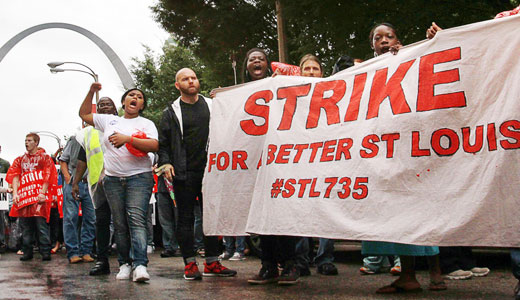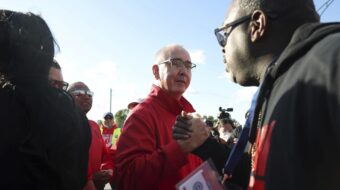
Two recently published reports shed damning light on the high cost of low wages in the fast food industry – an industry dominated by the restaurant giant McDonald’s, which raked-in over $5.4 billion in profits last year.
The reports – Super Sizing Public Costs: How Low Wages at Top Fast-Food Chains Leave Taxpayers Footing the Bill and Fast Food, Poverty Wages: The Public Cost of Low-Wage Jobs in the Fast-Food Industry – argue that low-wages in the fast-food industry cost taxpayers nearly $7 billion annually.
Medicaid and CHIP (the Children’s Health Insurance Program) account for more than half of the $7 billion, at an average of $3.9 billion annually. Additionally, due to low earnings, fast food workers’ families also receive an annual average of $1.04 billion in food stamp benefits and $1.91 billion in Earned Income Tax Credit payments.
“In effect,” the Rev. Martin Rafanan, the community director for St. Louis Can’t Survive on $7.35, told the People’s World, “taxpayers are directly subsidizing the enormous profits of these fast-food giants.”
The ten largest fast-food companies alone made more than $7.4 billion in profits in 2012 and paid their top executives more than $53 million in compensation.
According to Fast-food, Poverty Wages, “fast food jobs pay so little that 52 percent of families of front-line last-food workers rely on public assistance programs” and “compared to the overall economy, fast-food jobs are twice as likely as other jobs to pay so little that workers are forced to rely on public assistance (52 percent vs. 25 percent).”
Low-wage fast-food jobs cost tax-payers the most in California ($717 million), New York ($708 million), Texas ($556 million), Illinois ($368 million), and Florida ($348 million).
“Seven billion dollars is a huge amount of money that fast-food companies are draining out of our communities,” Rafanan continued. “It would be much better if that money could be spent improving our schools, fixing our roads or creating good-paying jobs.”
According to Super Sizing Public Costs, “McDonald’s represents the most costly fast-food company for tax-payers.” Low wages and lack of benefits at McDonald’s cost tax-payers “$1.2 billion every year in public assistance programs,” according to the report.
YUM! Brands (Pizza Hut, Taco Bell, KFC), Subway, Burger King and Wendy’s round-out the top five fast-food companies with workers who rely on public assistance.
The median average wage for fast-food workers is $8.69; an estimated 87 percent of fast-food workers do not receive health benefits. Furthermore, 67 percent of front-line fast-food workers are adults 20 and older; 68 percent are the main earners in their families and more than one-quarter are raising children.
According to Ken Jacobs, one of the authors of Fast Food, Poverty Wages, “these are conservative estimates. They do not take into account childcare costs, WIC [a special supplemental nutritional program for women, infants and children], section-eight housing or state-based programs.”
“This business model puts tax-payers on the hook, while rewarding corporate CEO’s,” Jack Temple, a policy analyst for the National Employment Law Project and co-author of Super Sizing Public Costs, said during a conference call with the press on October 15.
Temple added, “low-wage fast-food jobs are expensive for all of us.”
The reports come on the heels of a nation-wide wave of fast-food worker strikes; most recently strikes took place in over 60 cities across the nation with thousands of fast-food workers walking off their jobs.
Devonte Yates, a Milwaukee McDonald’s worker who receives food stamps, said, “I work hard. This is something I have to do to provide for my family.”
“The CEO of McDonald’s makes more in a day than I make in a year,” Yates added.
Willietta Dukes, a North Carolina Burger King worker who also receives food stamps, said she has worked in the fast-food industry for 16 years. She has two sons and works two jobs “just to put food on the table.”
Dukes added, “sometimes I have to go without my medicine because I can’t afford it.”
Fast-food workers nationally are calling for $15 an-hour in pay and the right to form or join a union without retaliation.
Jacobs also addressed the wave of non-traditional worker organizing taking place in fast-food, retail and other low-wage service sector jobs.
He said, “Workers are organizing regardless of collective bargaining. Collective bargaining would do the most good for workers on the job. Collective bargaining means better wages and better benefits. But these workers are organizing regardless of collective bargaining.”
Rafanan, who also serves as the Workers’ Rights Board co-chair for Missouri Jobs with Justice, summed-up the next-steps for fast-food workers: “Fast-food workers need to continue to build power, to develop their movement for $15 and a union, and build community support.”
Super Sizing Public Costs: How Low Wages at Top Fast-Food Chains Leave Taxpayers Footing the Bill was published by the National Employment Law Project and Fast Food, Poverty Wages: The Public Cost of Low-Wage Jobs in the Fast-Food Industry was published by the University of California Labor Center.
Photo: An August 27 demonstration by fast food workers takes place in St. Louis. It is one of many that took place in 58 cities across the nation. Derik Holtmann/AP












Comments